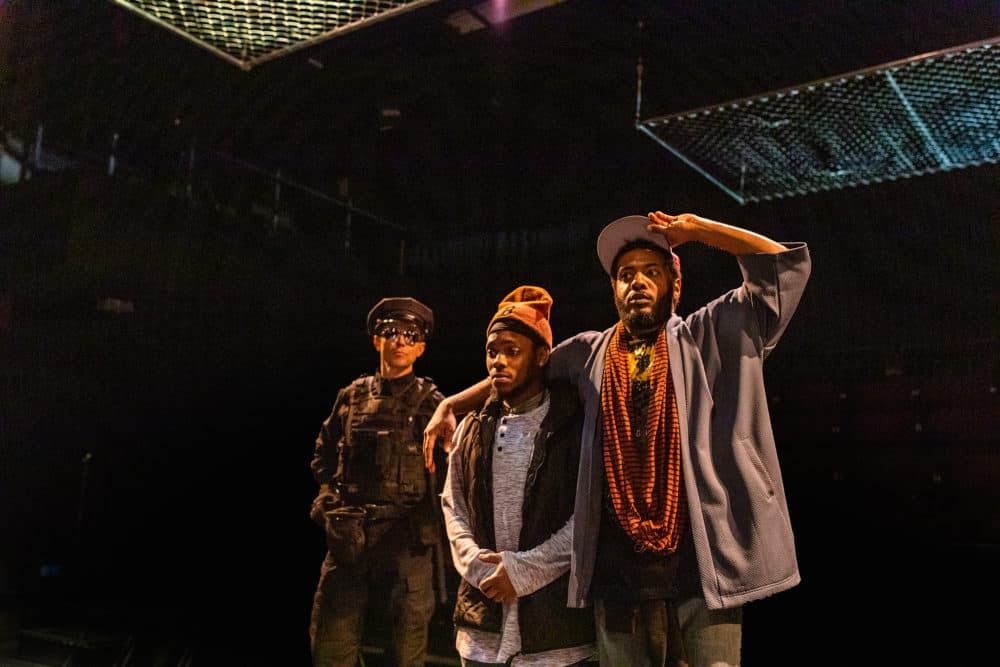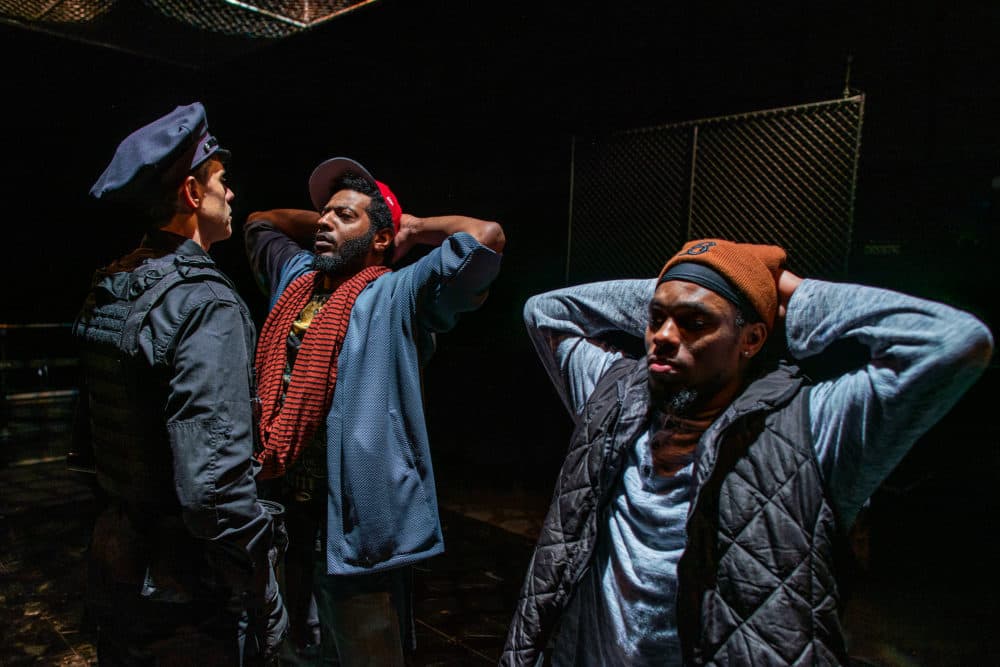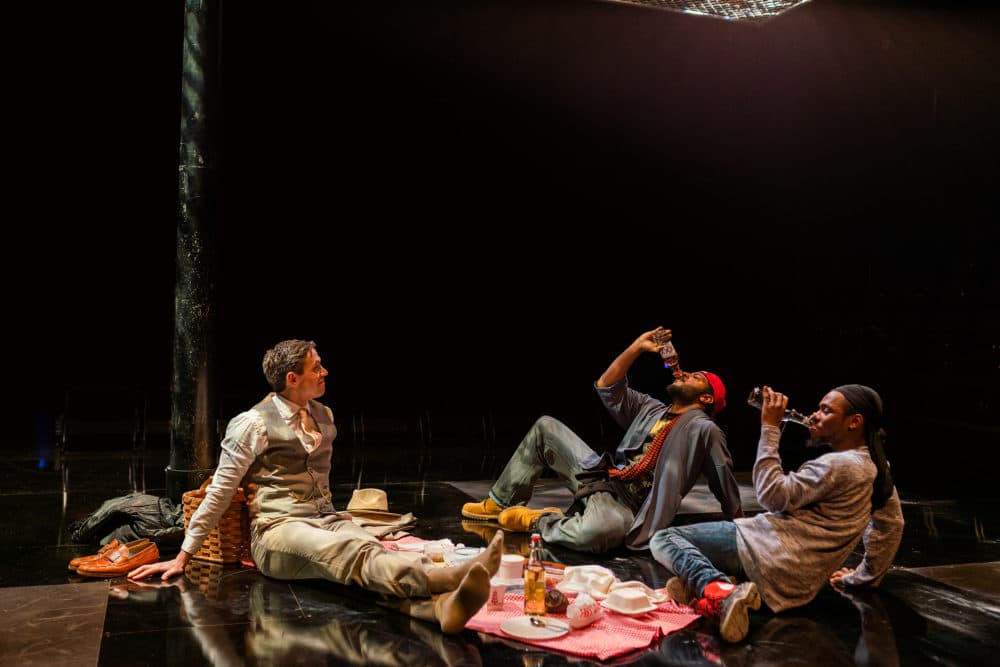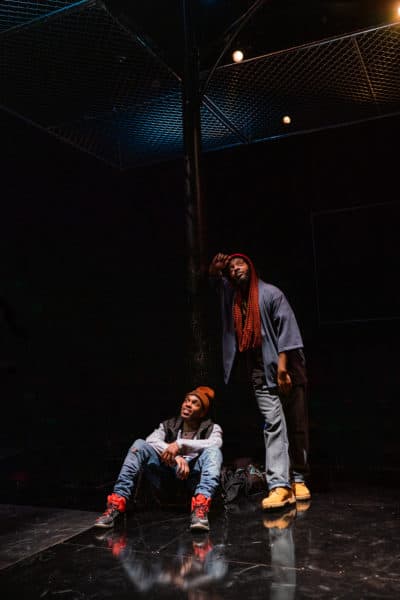Advertisement
REVIEW
'Pass Over' At SpeakEasy Stage Is An Intense And Affecting Experience

“Waiting for Godot” is exquisitely bleak: a couple of guys wait by a tree for salvation that never comes. But at least no one shows up juggling platitudes, malice or a gun.
In Antoinette Nwandu’s pained and powerful “Pass Over,” which is in its area premiere courtesy of SpeakEasy Stage Company and The Front Porch Arts Collective (at the Calderwood Pavilion through Feb. 2), two young black men while away the night on a ghetto street corner in an unnamed American city, hoping to dodge hopelessness, hunger and tedium. They're also trying to elude the bullet that may land, likely compliments of “the po-po," before they can escape the “block.”
If that terminology doesn’t tip you that there’s more to the Lucille Lortel Award-winning “Pass Over” than a Samuel Beckett rewrite, the program will. A collision of Beckett, the Book of Exodus and the Black Lives Matter movement, the theater piece is billed as taking place “now, right now | but also 1855 | but also 13th-century BCE.” The setting is “a ghetto street” but “also a plantation | but also Egypt, a city built by slaves.”

Its protagonists, Moses and Kitch (names taken from a slave manifest), play a game called “promised land top ten,” conjuring what they’ll get if and when they get there: collard greens and pinto beans, a drawer full of clean socks, a beloved brother back from the dead. Meanwhile the lack of a Red Sea, or of a white-jiggered society’s permission, keeps them glued to the block.
When “Pass Over” premiered in Chicago in 2017, a controversy erupted – not over the production (which was subsequently filmed by Spike Lee for Amazon) but over a review of it. A white critic opined that the play’s depiction of a menacing white policeman (in relation to “Godot,” one of its Pozzos) was itself racist.
But “Pass Over,” despite being grounded in some ugly realities, is not a realistic play. For goodness sake, it straddles millennia on a street corner.
"'Pass Over,' despite being grounded in some ugly realities, is not a realistic play. For goodness sake, it straddles millennia on a street corner."
And what lies beyond that corner is the dream of its two very specific young black men, alpha Moses and amiable Kitch, the former fierce, sorrowful, sometimes playful and armed with a vision, the latter bursting with danceable energy as the pair engage in a ritualized version of hanging out. They play a sort of tennis with lyrical street lingo while trying – at least most of the time – not to “pass over” to the flip side of being alive.

The myriad ways in which “Pass Over” mirrors “Godot” are both poignant and clever, as is its magical-realist retooling of the Exodus story. But the play’s genius lies in its conflation, hardly racist, of two white characters played by the same actor. This device effectively muddies the line between the outright white-supremacist threat exuded by the bad policeman and the mealy-mouthed white-liberal concern expressed by the play’s other interloper.
A mysterious figure in a light suit and straw hat shows up, ostensibly lost, bearing “salutations” and a picnic basket full of treats he wants to share. It is this awe-shucks figure, more than the policeman, who should make white theatergoers squirm.
But understand, white theatergoers (of whom I am one), that this play is not aimed at you and certainly not at helping you process your feelings about inferred complicity in racism and cyclical violence. Black and brown audience members are invited, at the end of the show, to remain and participate in a “healing circle”; white spectators are asked to take their reflections with them. We are allowed to find the theater piece harrowing but not to co-opt its depiction of tragedy.

That said, “Pass Over” is an intense and affecting experience, intensified in the SpeakEasy/Front Porch staging by the artful melding of styling and raw, deep emotion. It has been said of “Waiting for Godot” that it is a play in which nothing happens – twice. But director Monica White Ndounou keeps “Pass Over” moving at a fast, rhythmic clip. Its Moses and Kitch bounce up and down like balls as they move between restless sleep and waking, fear and cockiness, camaraderie, disgust and dissension. Ultimately, of course, they have each other’s backs since, in the pair’s shared perception, any intruder, real or symbolic, is probably out to kill them.
The Roberts Studio Theatre has been reconfigured for “Pass Over” so that the play is performed with attendees on all four sides. Baron E. Pugh’s simple scenic design places chain link on all sides as well as overhead. The only other scenery is a lamppost, standing in for Beckett’s tree.
Kathy A. Perkins’ lighting design is primarily dark, except when the surrealistic trespasser shows up with his quaint equivalent of a food truck and things turn as light as his suit. But the most potent contribution to the play’s mood is Anna Drummond’s sound design, a minimal but ominous intrusion of clanging metal, rippling winds and muted explosions that could be gunfire.
"But understand, white theatergoers (of whom I am one), that this play is not aimed at you and certainly not at helping you process your feelings about inferred complicity in racism and cyclical violence."
As Moses and Kitch, Kadahj Bennett and Hubens “Bobby” Cius could not be more distinct, or more symbiotically connected. Bennett’s Moses is the sadder and prouder of the pair, almost dour when he’s not shimmying or snapping, but intermittently armed with “plans to rise up to my full potential” (not to mention, for a brief moment, magical powers). Cius’ Bobby is Moses’ follower and friend, more ebullient and naïve but also more cautious. And though you may not catch every word of dialogue, the two make of their feathered patois a sort of music in which the n-word is an oft-struck note.
In the dual role of the wholesome, cryptic cracker in the suit, called Mister (though, tellingly, he informs Moses and Kitch that his name’s Master) and the goading cop in dark glasses and riot gear, called Ossifer, the accomplished Lewis D. Wheeler does double duty, creepily wielding the carrot and then the stick. In the end, of course, he eschews both, instead serving up cliché abdication.
In Nwandu’s explosive yet tender drama, he gets the last, meaningless word. But as the final tableau makes clear, it’s an empty mouthful.
